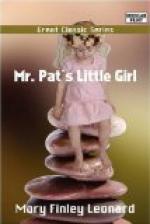Her uncle now managed to join her by stepping over the backs of chairs, and it was not long before the sale began.
From the start it was evident the city people had not come to look on. Bidding was spirited, and Miss Betty’s silver soon went “out of sight,” as Mrs. Parton expressed it.
Rosalind was highly entertained, and whenever her uncle put in a quiet bid, as he did now and then, she held her breath, fairly, for fear he would not get what he wanted.
To Allan there was an unreality about it all. It seemed so short a time since he and Genevieve and Celia had been children together, taking tea with Cousin Thomas and Cousin Anne. What a strange household the two had constituted in this old mansion, where their whole lives had been spent. As he thought of it, he felt he had an inkling of why Thomas Gilpin had done as he did. Perhaps he had felt it would be better to have a clean sweep, and thus make possible for some one a fresh beginning in the old place. A fine substantial house it was, needing only a few improvements to make of it, with its spacious, high-ceiled rooms and wide hall, a most desirable residence.
Rosalind’s voice recalled him. “May I come again this afternoon, Uncle Allan? They may begin on the furniture.”
The auction continued for three or four days. Rosalind became the proud possessor of the dolphin bureau; and her uncle obtained also the miniature of Patricia, for what seemed indeed an extravagant sum, but he had given his promise to his sister.
At the close of the sale on the second day, Allan went into the library to examine some books. The throng of onlookers and buyers had dispersed; only the auctioneer’s assistants remained at work in the hall. Purchases had been promptly removed, and the house already seemed dismantled and bare.
Absorbed in his search for a volume not on the catalogue, but which he felt sure was somewhere on the shelves, he became aware of Celia Fair’s voice just outside the door. The next moment she entered the library and, going to the fireplace, stooped to examine the andirons. She had not observed him. Should he go quietly out, or make one more appeal to be heard? Allan hesitated.
With her hand on the high mantel-shelf and her head against her hand, Celia stood looking down on the vacant hearth. There was something of weariness in the attitude. What a delicate bit of porcelain she seemed! Allan had a sudden, illogical vision of a fire of blazing logs, and himself and Celia sitting before it.
He moved out of the shadow and she saw him; but though she stood erect and tense in a moment, she did not, as he expected, hasten from the room. Instead, she hesitated, and there was an appeal in her eyes very different from the defiance of a few weeks ago.
“I didn’t know there was any one here,” she said; adding, “Mr. Whittredge, I have wanted to have an opportunity to say that I regret my rudeness. I was unreasonable—I am sorry.”




